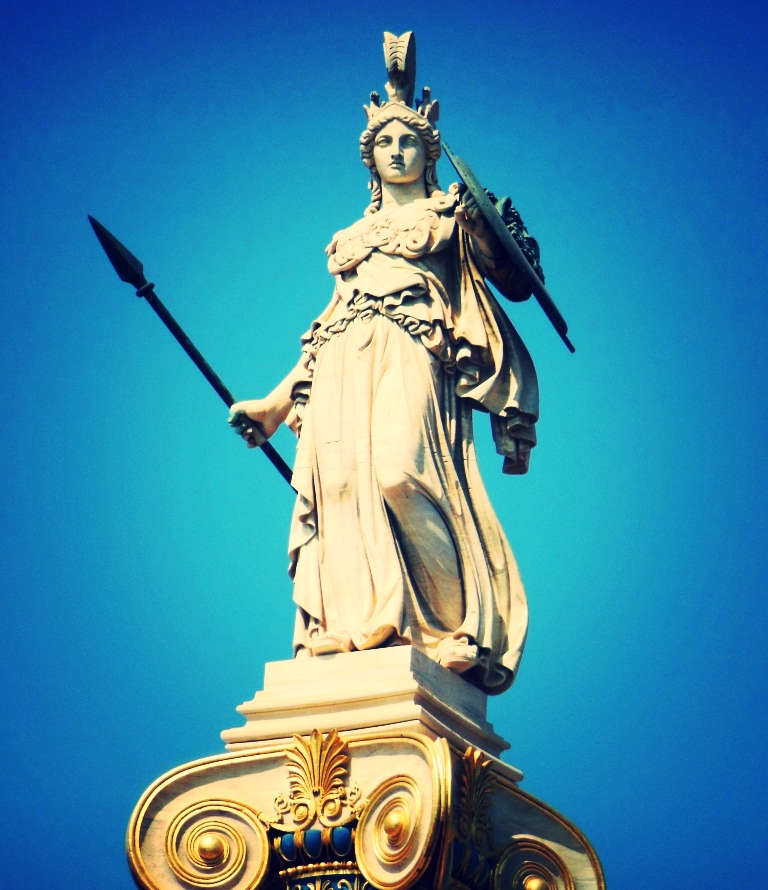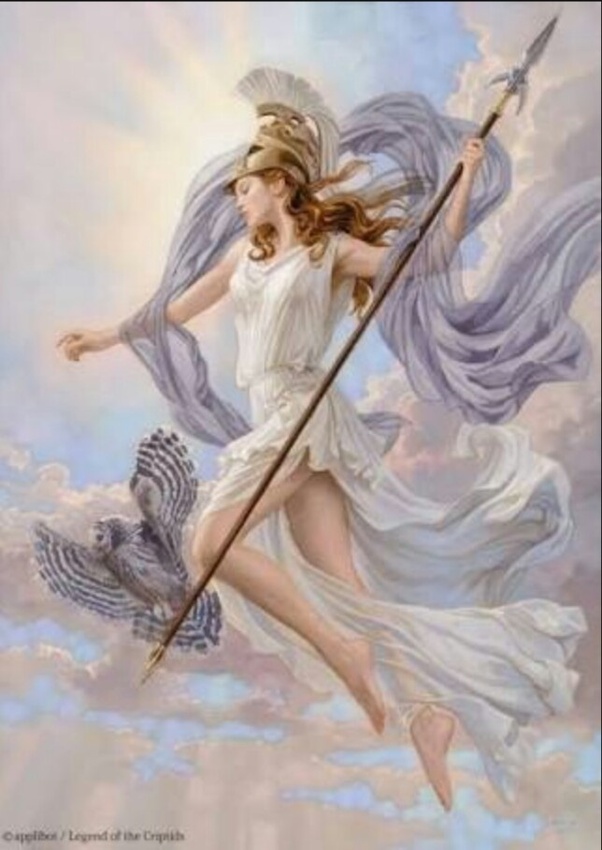IS THERE A GOD OF WISDOM?
Yes - but she’s a GODDESS, not a mere male god.
Athena - first born daughter of Zeus, and second most powerful deity in the Greek Pantheon (after Zeus) was the Goddess of Wisdom. Her symbol was the owl.
A Statue of Athena - Goddess of Wisdom (and a whole lot of other things).
Of course she wasn’t only the goddess of wisdom. She was / is also the goddess of courage, inspiration, civilization, law and justice, strategic warfare, mathematics, strength, strategy, the arts, crafts, and skill. Chess was unknown to the early Greeks and Romans, but it’s pretty clear she would have been their goddess of Chess too. Oh, and don’t confuse strategic warfare with good old fashioned masculine un-strategic warfare either. Presumably we can leave it to some mindless masculine god like Mars to bash his way around a battlefield.
The Romans knew Athena as the goddess Minerva.
A very fair skinned depiction of Minerva, complete with owl.
However, to the Romans, who weren’t big on things like wisdom, she was a minor goddess. Mars was the Roman god of war.
Emphasis in depictions is usually placed on the brightness of her eyes and the owl, but these are difficult to do in statues.
As a side note, it’s interesting to note that in JK Rowling’s Harry Potter series the wise Professor McGonnagall was named Minerva.
There’s a university with a pillar with an Owl perched on top to symbolise a place of wisdom. The snail of Knowledge is trying to get to the top, at which point it would be consumed.
There are lots of Gods and Goddesses associated with Wisdom. Wikipedia lists 28 here.
Care needs to be taken. As at 1.1.2019 readers will note that Athena and Minerva are NOT included on this list, but The Holy Spirit is. Since the Holy Spirit is part of the triune god of Christianity it would seem to follow that if the Holy Spirit is listed, God the Father and Jesus the Son should be too. One understands why they aren’t, but it is indicative of the care required when considering other religions. Krishna and Ganesha are both listed from the Hindu pantheon. Agathodaemon is listed for the Ancient Greeks, but he’s spirit of the vineyards. Coeus, a Titan, is also listed, possibly because he is associated with rational intelligence. However, Phoebe his sister, who represents prophetic wisdom isn’t listed … the list clearly has flaws. No one ever worshipped Coeus. Prometheus is also listed from the Greek pantheon. He is indeed a symbol for scientific seeking of knowledge.
Which leads to another point, there is a big difference between knowledge and wisdom. Symbolic gods and goddesses of knowledge do not automatically qualify as symbols or avatars of wisdom. At least, not on this site.
Seeking ‘Knowledge Deities’ on wikipedia gives you a very different list here. It includes familiar names as well as Apollo, the muses, Hephaestus - the technology god, Metis - Oceanid of wisdom and wise counsel, and Hermes who is another god of many topics.
Strangely Sophia - a common Greek name meaning wisdom, is listed as a Gnostic feminine personification of divine wisdom.
Statue of Sophia - Personification of Wisdom in Ephesus
The Hindu gods are particularly difficult. For example, Savitri is listed as a goddess of wisdom in the Hindu pantheon. Savitri is a common name in the Hindu pantheon so one must first make sure one has the right one. As Mother Savitri she is the manifestation of the goddess Saraswati, the Hindu goddess of learning and arts. Savitri Maa is also the consort of Brahma - the creator God who is one of the trimurti - the big three (Brahma, Vishnu and Shiva). Where’s Krishna, you may ask. Well Krishna is the eighth avatar of Vishnu. But he’s also worshipped as the supreme God. Although Brahman is the one universal supreme consciousness and creative force. You need to be a Hindu to wrap your head around this stuff.
Mother Savriti Maa, consort of Brahma, is identified as a goddess of wisdom, intellectual knowledge, fine arts, and creativity.



